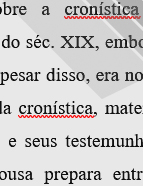

................................
Other research followed with the same philological orientation. Particularly noteworthy were the research of the linguist and historian Samuel Armistead (whose texts were published initially in the journal Romance Philology, founded at the end of the previous decade), and the research of the afore- mentioned Diego Catalán, influenced by Cintra, especially with regard to what he thought was the Portuguese version of the Crónica de España and the origins of Portuguese and Castilian historiography (he also published these texts in that American journal and pursued in the book De Alfonso X al Conde de Barcelos..., 1962).
This was, however, the smallest part of the historiographical production. In fact, the 1950s were still dominated by the line of studies of Magalhães Basto, from the 1940s, the focus of which continued to be the Crónica de 1419 (research compiled in the volume Estudos [Studies], 1959) and partly by new interpretations of Fernão Lopes, with the contribution of names such as Albin Beau, a German studies scholar from the Universidade de Coimbra who studied the literary features, eulogies and the "national sentiment" in the chronicler of Avis (compiled in the Estudos published in 1959), António Brásio, who focused mainly on historiographical aspects such as the "national crisis of 1385" and issues of the chronicles' authorship, and also Mário Martins, whose research was geared mainly towards the field of spirituality.
The same actors continued to feature in the following decade with very similar orientations, but they were joined by some historians who then turned to chronicle production. Such was the case of António Borges Coelho, who in 1966 edited the Crónica do rei D. Duarte [Chronicle of King D. Duarte] of Rui de Pina, who had already published Raízes da Expansão Portuguesa [Roots of Portuguese Expansion] (1964) and A revolução de 1383 [The 1383 Revolution] (1965). These texts were two examples of the deconstruction of the dominant theories of a national grandeur supported by the chroniclers of Avis and disseminated by Salazar's regime, which led to them being banned and Borges Coelho interrogated. In fact, the 15th-century chronicles received the most attention from researchers throughout the 1960s and 70s, some of whom with social concerns they associated with the author of the Crónica de D. João I [Chronicle of D. João I] and the relevance of the popular crowds in that text. It was not by chance that A revolução de 1383 was given such a title: the interpretation of Fernão Lopes is one of rebellion, of a fight to change the status quo in a real "national bourgeois revolution" (Coelho, A revolução...,[The revolution] 6th ed. 2018, p. 127).
